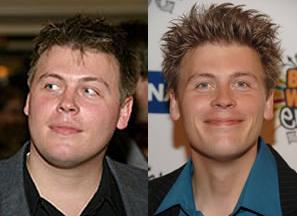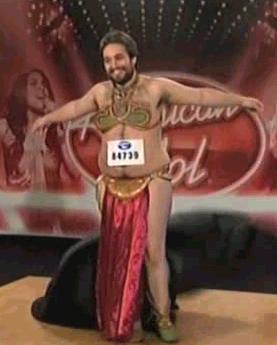Is fat acceptance working?
I’d been trying to avoid weight loss ads, but found myself recently paying attention to them … with a new focus.
Before pictures in weight loss ads look GOOD to me! I think FA is working for my eyes, and it gives me hope that we can change everyone’s eyes and add a new way of looking at fat.
Allowing myself the possibility that fat can be attractive, to not automatically discount it because I’m instructed by my culture to do so has lifted the scales from my eyes — well, maybe except for the corner of one eye I use to look at myself sometimes.
I am proof people CAN change how they look at fat! I never thought I could but it’s happening. This is a new one for me, and I credit fat acceptance.
Here’s a woman before and after WLS:

I think she looked great before she had the surgery.
Here’s Christian Finnegan, “Best Week Ever” panelist:

He’s even cuter before.
Here’s another woman, this time after WLD:

She was just as pretty before the weight loss.
These are but three examples. When I happen upon a weight loss ad or a weight loss reality show, I catch myself finding the participants just as attractive as (or even more so) before the weight loss. Yes, the “after” shots in these before&after’s are better quality pictures usually: new hairstyle, make-up, dressed to the nines in well-fitting clothes. But it’s really the confidence the “before” is lacking that the “after” has when basking in societal approval. Confidence is so, so much to do with it. That is exactly what we must claim/reclaim: the confidence to exist just the way we are.
I recently came across my diet journal, which includes various snippets of “thinspiration,” including the “Half Their Size!” People magazine from January ’06 (I got this to plaster on my wall for motivation). Looking at it now, with new eyes, I see how many of the before pix are showing beautiful people the way they are … it’s really the confidence to own themselves that’s lacking, if anything.
One note to myself in my horridly dysfunctional diet journal is that “even plus size YIM avatars look bad.” Jeez, how brainwashed was I?

They actually look closer to “average size” than plus size, IMO. And they look great. I think it’s cool Yahoo Avatars added some plus size outfits. I wish they’d take it even further.
It’s really such a pleasant surprise, this new way of looking at fat. Some imagery not in the before/after vein that has also helped widen my perspective include Beth Ditto on the cover of NME, the adipositivity project (here’s my current fave from there [NSFW]), and — OK, this one’s a bit unusual, but — the guy from the “American Idol” auditions who dressed like Princess Leia from the beginning of Return of the Jedi:

I may be in the minority on this one, but I think his body looks good with the outfit. And oddly enough, it’s made me think that maybe, just maybe, if I wanted to cosplay as Princess Leia or any character, I could do that and enjoy myself. I never thought this before. Cosplay was definitely out of bounds for me because of my fat, pre-FA.
I realize some people think the “right to be pretty” isn’t important. But I do. Here’s why.
The “right to be pretty” isn’t frivolous. It’s the right to EXIST. To be indoctrinated that NO ONE could ever possibly find you attractive is to negate your very existence. It denies not only your looks but also it says that no other part of you can possibly make up for your looks — your “lack of good looks” eclipses the rest of you as a person. It wants to render you worthless.
“Such a pretty face … if only …”
“All fat women can do to be attractive is their nails.”
WTF? How dare people be so narrow-minded as to dismiss a whole PERSON based on one attribute (fat).
To tell (and convince) fat people that they are unattractive is to dehumanize them. It seeks to make a part of them worthless and that can bleed into other areas of their lives. The “right to be pretty” is a step in accepting the whole person and normalizing fat bodies. The urge to mate is a strong biological drive — if not the strongest (rivaled only by, what, eating and drinking?). Beauty is tied to attraction is tied to love. Teaching a fat person she/he is unattractive forevermore is teaching her that she’s unlovable and unhuman.
It’s a tool of the haters to say (and make us and others believe) fat=ugly. How do those types of people even know if they naturally find fat people unattractive? They didn’t grow up in a vacuum. They grew up in an anti-fat culture! They weren’t allowed to view fat as attractive, if they chose to.
We really can’t pretend that there’s no conditioning involved when it comes to attractiveness. It is not solely biological/genetic/primal. When TPTB decide someone’s “The Hottest” and you just kinda scratch your head. Hrmm. Everyone, it seems, jumps on the bandwagon. Double hrmm. For me, examples include Gisele Bundchen and Jennifer Barretta. I know some find them “hawt” and I can understand why, even though I don’t agree (I especially don’t agree that pool table+bikini is hot, let alone makes any sense).
But sometimes I really do believe regular folks think a certain celeb is hot merely because they were told to. I came across a very interesting comment a few years back that suggested had Hugh Hefner’s preference run toward darker and larger women, that would be the current beauty ideal. It’s a fascinating and scary hypothesis to think that one man has managed to impose his aesthetics on the rest of his culture.
Do you ever get the sense that people just do as they’re told when it comes to what’s/who’s considered attractive? Like, the media decides a certain starlet is über-hot, and all of a sudden, the majority follows suit. I find it especially jarring when the “celebrated hottie” is actually not hot at all. Equally frustrating is when I find a person beautiful, but their body type dictates they aren’t permitted to be considered beautiful. Like why are “butterfaces” (a horrible term, yes) still categorized as “hot,” but the inverse (butterbodies? i.e., beautiful faces with not conventionally attractive bodies) not?
“A resourceful woman who is almost downright plain can achieve the reputation of a beauty simply by announcing to everybody she meets that she is one.”
–Erté
It’s what the media does, too. Many “Most Beautiful/Most Sexy/Most Hottest” are but constructions of the media.
The women (all celebs, natch) considered “the most beautiful in the world” are considered ugly by some. Those same non-fans acknowledge the fans’ ability to find the celebs attractive. Clavicles showing (I remember that part in The English Patient, the Almásy Bosphorous) — I don’t find that in the least attractive, but I can see why others do. That’s what’s missing when it comes to the general view of fat and attractiveness — an as-you-please to be “permitted” to find whatever you like attractive. Again, attracted to versus finding attractive are two different things. I am not attracted to women, but I find a great many of them attractive.
Frankly, I don’t find bones sticking out attractive. I know some do, and I see how they can be seen as attractive. That’s all I ask/hope for when it comes to fat. If you don’t find it attractive (and I don’t believe this is an innate, primal preference at all … I think it can be learned/unlearned), at least open your eyes wide enough to see how someone else can see it as attractive. I mean, it has worked in the opposite direction, hasn’t it? The media has presented us with ever-shrinking ideals, and for the most part, we seem to have accepted them (as a society). Why wouldn’t a more inclusive media representation of beauty not only work in broadening our attraction horizons, but in increasing our respect for everyone, no matter how they differ from us?
And I may be El Capitan Obvious here, but if the media chose to feature different sizes, those sizes would become accepted. If men and women were told it was OK to find a plus-size woman/man attractive by virtue of one being on the cover of FHM or whatever, they would/could find them attractive. They’d be given permission to and perhaps allow themselves or at least others to, too. I wish for a democratic view of attractiveness and beauty. I think a great deal more people are and can be considered attractive than currently “permitted” — by themselves and their societies.
When fat people view themselves as ugly, it reminds me of how fat peoples’ lives are adversely affected by the ill treatment they receive because they’re fat, NOT adversely affected by the fat itself. Perhaps fat people believe they are ugly because of the treatment they receive, not because of their fat itself.
The “right to be pretty” is twofold: from within and from without.
On the right to be pretty from within, here’s a comment I saved from Jezebel.com by girlinterrupted:
“It’s so easy to love yourself. You just DO IT. You wake up one day sick of hating yourself, sick of the energy wasted on hating yourself and trying to change yourself, sick of the fact that whether you are fat or skinny, society will still judge you, and you realize that all you have to do to win is drop out of the fucking race. And you DO IT. It’s so easy.
I have worn a size 14/16 since puberty. I woke up one day with big boobs, big hips, and my period, and that was all she wrote. When I hated myself, I didn’t get hit on. Now I get hit on every day. The only thing that has changed? My attitude.
Seriously, love yourself. It’s so much easier than hating yourself.”
If we can convince ourselves we deserve to love ourselves and be loved (and do it), that would convince us that we don’t deserve the ill treatment. To stand up for oneself, one must respect oneself: the “right to be pretty” represents that self-esteem. It could just as easily be the right to be smart, the right to be industrious, the right to smell good, the right to be fit — anything that contradicts the tired old stereotypes used as weapons against fat people. The “right to be pretty” is a right that’s more than skin-deep. It’s the right to exist in the world. To be seen and looked upon. The right to allow oneself to be seen as pretty. The right to allow others to see you as pretty. It’s really about the right to be seen, to have a visual voice.
On the right to be pretty from without — I’ve covered this quite a bit above, but also a lot of what the “fat is unattractive always” bleaters find attractive IS a result of conditioning. So it wouldn’t kill them to broaden their perspective. I have done so. It came out of the blue and was a very nice surprise, but I just have to wonder since it’s happened for me, can it happen for others?
So, no, fat-haters, I won’t ask you to be attracted to us. I will expect that you find us attractive — in that others have been, can be, and are attracted to us fat people and that you can appreciate why that is, if only you put your glasses on.
We fat people are dismissed on the basis of our looks. Why would it not be a worthy endeavor to fight for acceptance of our looks? According to the rest of the world, our looks and what they (erroneously) “prove” about our character ARE the problem. It’s the justification for discriminating against us. Even when a person concedes that fat is beyond a person’s control and is not unhealthy, etc. — he still ultimately says, “But it’s still fucking ugly.”
The “right to be pretty” is the right to *be* — and the right to be more inclusive.
You CAN be fat and beautiful
and fat and smart
and fat and fit
and fat and whateverthehellyouplease …
You CAN be fat and *BE*.


